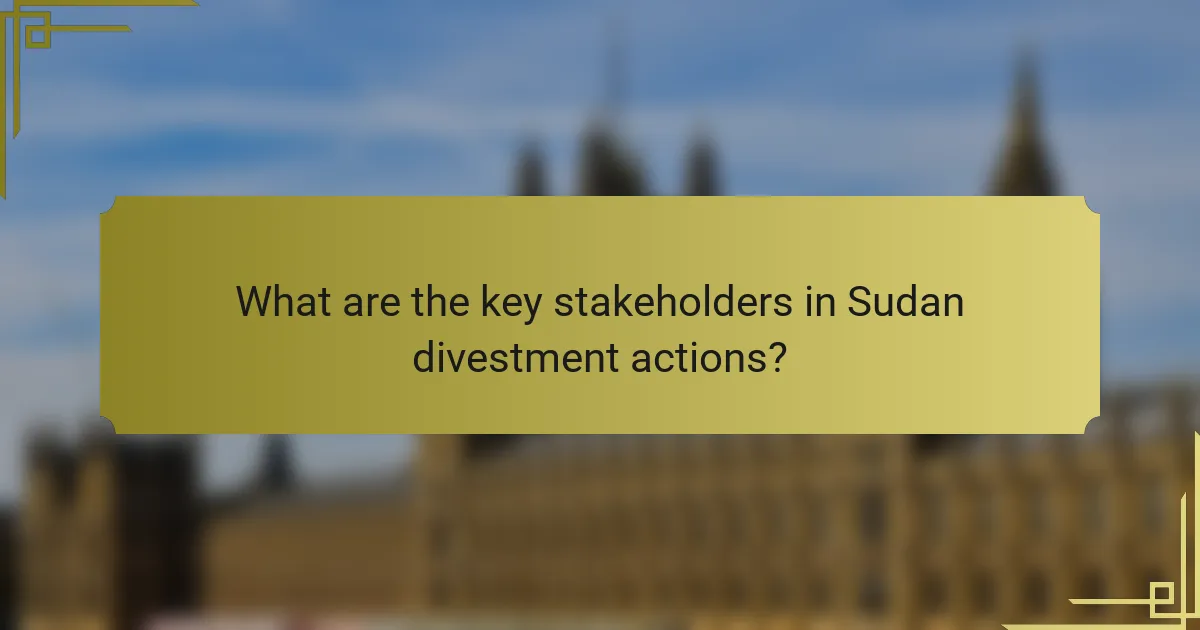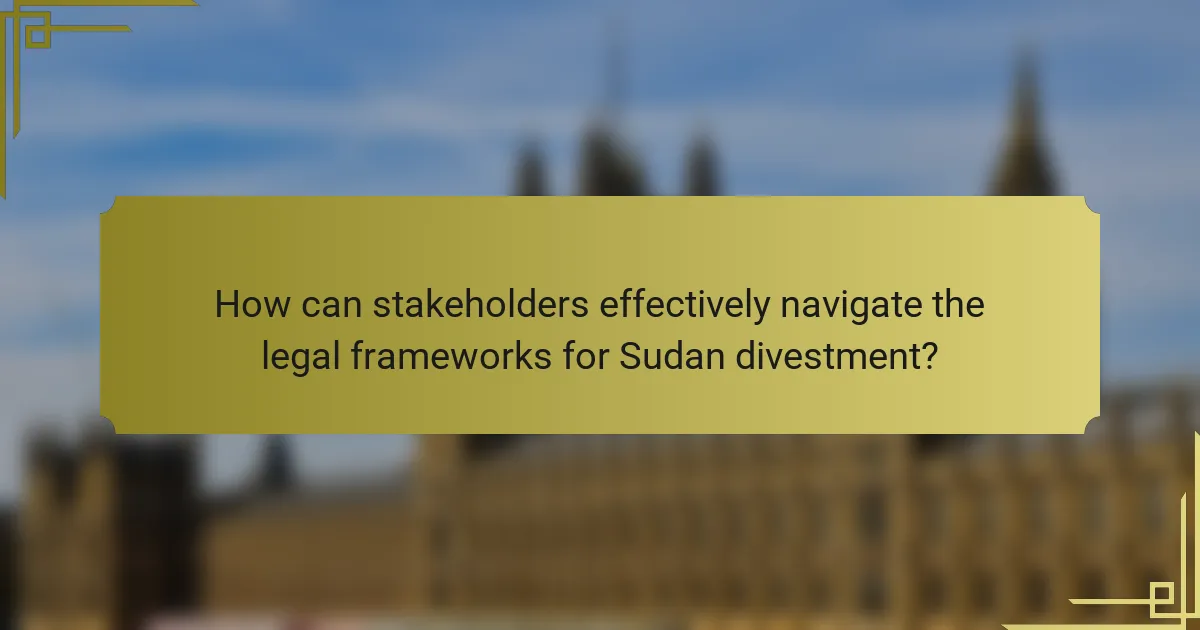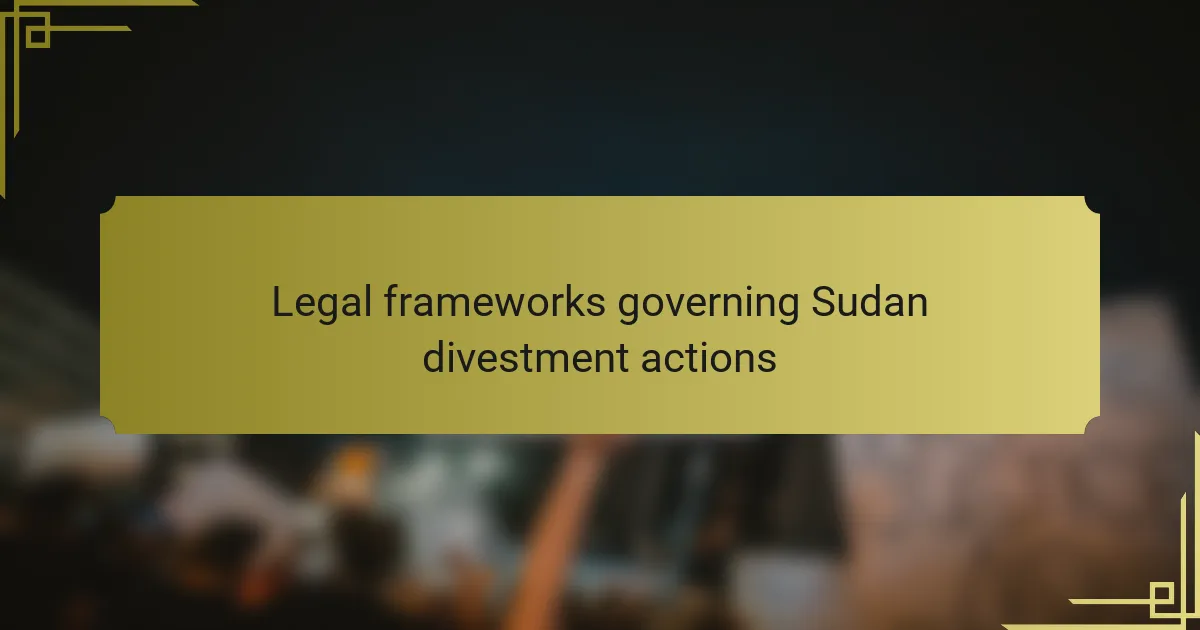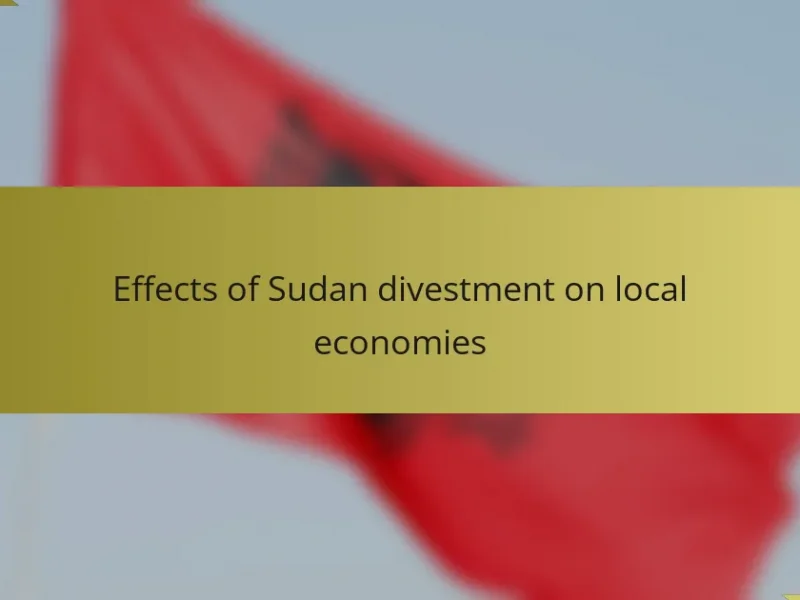The legal frameworks governing Sudan divestment actions primarily consist of U.S. federal laws and state-level legislation, notably the Sudan Accountability and Divestment Act of 2007. This act enables states to divest from companies operating in Sudan due to human rights violations in the Darfur region. Various states have implemented their own divestment laws that mandate state pension funds to withdraw investments from specific companies involved in Sudan. Key stakeholders in this process include government entities, non-governmental organizations (NGOs), private investors, and international organizations, all of which influence the direction and effectiveness of divestment actions. Understanding and complying with these legal frameworks, including international sanctions, is essential for stakeholders to mitigate legal risks and make informed divestment decisions.

What are the legal frameworks governing Sudan divestment actions?
The legal frameworks governing Sudan divestment actions primarily include U.S. federal laws and state-level legislation. The Sudan Accountability and Divestment Act of 2007 allows states to divest from companies operating in Sudan. This act was established to respond to human rights violations in the Darfur region. Additionally, various states have enacted their own divestment laws targeting investments in Sudan. These laws often require state pension funds to divest from companies involved in certain activities in Sudan. The legal landscape is also influenced by international sanctions imposed on Sudan. These sanctions restrict economic engagement with the Sudanese government. Compliance with these frameworks is essential for investors to avoid legal repercussions.
How do international laws influence Sudan divestment actions?
International laws significantly influence Sudan divestment actions by establishing legal frameworks that govern investment and trade. These laws create obligations for countries and corporations regarding human rights and environmental standards. For instance, the United Nations sanctions against Sudan due to human rights violations compel foreign investors to reconsider their involvement. Additionally, the U.S. Office of Foreign Assets Control (OFAC) enforces regulations that restrict financial transactions with Sudanese entities linked to conflict. Compliance with these international laws often leads companies to divest from Sudan to avoid legal repercussions. Furthermore, international treaties and agreements can impose penalties on nations that fail to comply with divestment norms, reinforcing the impact of these laws.
What specific international treaties impact divestment in Sudan?
The specific international treaties that impact divestment in Sudan include the Comprehensive Peace Agreement (CPA) and various United Nations Security Council Resolutions. The CPA, signed in 2005, aimed to resolve the conflict between the north and south of Sudan and has implications for economic activities in the region. UN Security Council Resolutions, particularly those addressing sanctions against Sudan, also influence divestment actions. These resolutions impose restrictions on trade and investments related to the Sudanese government and specific sectors. The combination of these treaties creates a legal framework that affects how entities can engage with Sudan.
How do these treaties affect foreign investment in Sudan?
Treaties can significantly impact foreign investment in Sudan by providing legal protections and frameworks for investors. They often establish guidelines for dispute resolution, property rights, and investment guarantees. Such treaties can enhance investor confidence, making Sudan a more attractive destination for foreign capital. For example, bilateral investment treaties (BITs) typically offer assurances against expropriation and ensure fair treatment. These protections can lead to increased foreign direct investment (FDI). According to the United Nations Conference on Trade and Development (UNCTAD), countries with BITs tend to attract more FDI compared to those without such treaties. Therefore, the presence of treaties can create a more favorable investment climate in Sudan.
What role do national laws play in Sudan divestment actions?
National laws significantly influence Sudan divestment actions by establishing legal frameworks that guide investment decisions. These laws can impose restrictions on financial transactions with entities linked to the Sudanese government. For instance, the United States has enacted sanctions that prohibit American companies from investing in Sudan. Such regulations compel businesses to divest from Sudan to comply with national legal requirements. Additionally, national laws can provide legal protection for companies that choose to withdraw from Sudan due to ethical concerns. This legal backing reinforces corporate social responsibility and aligns with international human rights standards.
Which Sudanese laws are relevant to divestment actions?
Sudanese laws relevant to divestment actions include the Investment Encouragement Act and the Companies Act. The Investment Encouragement Act provides a framework for foreign investments and outlines conditions for divestment. The Companies Act regulates corporate governance and shareholder rights, impacting divestment decisions. Additionally, the Sudanese Constitution establishes property rights, which are crucial in divestment scenarios. These laws collectively shape the legal landscape for divestment actions in Sudan.
How do these laws interact with international regulations?
Laws governing Sudan divestment actions interact with international regulations through compliance and alignment. These laws often reflect international human rights standards and economic sanctions. For example, U.S. divestment laws align with the U.N. sanctions imposed on Sudan. Additionally, international regulations can influence national laws by setting standards for corporate behavior. Companies must navigate both domestic laws and international obligations. This dual compliance ensures that actions taken are legally sound globally. Historical precedents show that nations often adjust their laws to adhere to international frameworks. Thus, the interaction is a continuous process of alignment and adaptation.
What are the implications of divestment actions on Sudan’s economy?
Divestment actions significantly impact Sudan’s economy by reducing foreign investment. When investors withdraw, it leads to decreased capital inflow. This can result in lower economic growth rates and increased unemployment. Additionally, divestment may weaken the local currency due to reduced demand for Sudanese assets. The loss of investment also affects infrastructure development and public services. Furthermore, divestment can lead to increased economic isolation, limiting trade opportunities. Historical examples show that countries facing divestment often experience long-term economic challenges. Thus, the implications of divestment actions on Sudan’s economy are profound and multifaceted.
How does divestment affect Sudan’s foreign relations?
Divestment negatively affects Sudan’s foreign relations. It leads to decreased foreign investment and economic isolation. Countries and companies may withdraw support due to ethical concerns. This withdrawal can diminish Sudan’s diplomatic leverage. For instance, divestment campaigns targeting Sudan’s government have intensified since the Darfur conflict. Such actions have prompted nations to impose sanctions. Consequently, Sudan faces challenges in securing international partnerships. The cumulative effect is a strained relationship with key global players.
What are the potential economic consequences of divestment for Sudan?
Divestment from Sudan may lead to significant economic consequences. It can result in reduced foreign investment, as companies withdraw their capital. This withdrawal can decrease job opportunities within the country. Additionally, divestment may lead to a decline in government revenue from taxes and fees associated with foreign businesses.
The loss of investment can also weaken Sudan’s economic stability. According to the World Bank, Sudan’s economy relies heavily on foreign investment for growth. Furthermore, divestment can hinder access to international markets. This can lead to reduced exports and increased economic isolation. Overall, the economic consequences of divestment can severely impact Sudan’s development and financial health.

What are the key stakeholders in Sudan divestment actions?
The key stakeholders in Sudan divestment actions include government entities, non-governmental organizations (NGOs), private investors, and international organizations. Government entities, such as the U.S. Department of State, play a crucial role in shaping policies. NGOs advocate for human rights and ethical investment practices. Private investors, including companies and financial institutions, assess risks and benefits of divesting. International organizations, like the United Nations, provide frameworks for compliance and monitoring. These stakeholders influence the effectiveness and direction of divestment actions in Sudan.
Who are the primary actors involved in Sudan divestment?
The primary actors involved in Sudan divestment include government entities, financial institutions, and non-governmental organizations (NGOs). Government entities often create policies that mandate divestment from Sudan. Financial institutions, such as banks and investment firms, implement these policies by withdrawing investments. NGOs play a crucial role in advocating for divestment and raising public awareness about the situation in Sudan. These actors collaborate to influence corporate behavior regarding investments in Sudan. The effectiveness of their actions can be seen in the reduction of foreign investments in Sudanese companies linked to human rights abuses.
What roles do governments play in divestment actions?
Governments play a crucial role in divestment actions by establishing legal frameworks and regulations. They can implement policies that encourage or mandate divestment from specific sectors or entities. For instance, governments may impose sanctions against countries or companies involved in human rights abuses. These sanctions often lead to divestment by public and private entities. Additionally, governments can provide guidance on ethical investment practices. They may also create incentives for investors to withdraw from harmful investments. Historical examples include the U.S. divestment from South Africa during apartheid. This demonstrates how government actions can effectively influence divestment strategies. Overall, government involvement is essential in shaping the landscape of divestment actions.
How do non-governmental organizations influence divestment policies?
Non-governmental organizations (NGOs) influence divestment policies through advocacy and public campaigns. They raise awareness about ethical concerns related to investments in specific regions or sectors. NGOs often mobilize public opinion to pressure companies and governments to reconsider their investment strategies. They provide research and reports that highlight the negative impacts of continued investments. For example, NGOs have documented human rights abuses in Sudan, prompting calls for divestment. Their efforts can lead to policy changes at both corporate and governmental levels. Additionally, NGOs may collaborate with other stakeholders to amplify their message. This collective action can significantly shape the discourse around divestment policies.
What interests do corporations have in Sudan divestment actions?
Corporations have various interests in Sudan divestment actions. Primarily, they aim to mitigate financial risks associated with political instability. Sudan has faced significant unrest, impacting business operations. By divesting, corporations can protect their investments from potential losses. Additionally, corporations may seek to align with ethical standards and corporate social responsibility. Public perception plays a critical role in brand reputation. Divestment can demonstrate a commitment to human rights and social justice. This is particularly relevant in response to Sudan’s historical conflicts and humanitarian issues. Moreover, legal frameworks may impose sanctions or restrictions on business activities in Sudan. Compliance with these regulations is essential for corporations to avoid legal repercussions.
How do corporate social responsibility policies affect divestment decisions?
Corporate social responsibility (CSR) policies significantly influence divestment decisions. Companies often align their financial strategies with ethical standards outlined in CSR policies. When a corporation identifies conflicts between its CSR commitments and its investments, it may choose to divest. For example, if a company’s CSR policy emphasizes human rights, it may divest from entities linked to human rights abuses. This alignment is particularly relevant in regions with complex legal and ethical landscapes, such as Sudan. Research indicates that firms with strong CSR policies are more likely to engage in divestment to maintain their public image and stakeholder trust.
What are the financial motivations behind corporate divestment in Sudan?
Corporate divestment in Sudan is primarily motivated by financial risk management. Companies often seek to minimize exposure to unstable political and economic environments. Ongoing conflicts and sanctions increase operational risks, leading firms to withdraw investments. Financial losses from potential asset devaluation drive divestment decisions. Additionally, reputational risks associated with human rights violations can affect profitability. Firms prioritize markets with stable returns and predictable regulatory frameworks. The withdrawal of major corporations reflects a shift towards safer investment landscapes. In 2021, the World Bank reported significant declines in foreign direct investment in Sudan due to these risks.

How can stakeholders effectively navigate the legal frameworks for Sudan divestment?
Stakeholders can effectively navigate the legal frameworks for Sudan divestment by understanding relevant laws and regulations. This includes familiarizing themselves with international sanctions and domestic laws that impact divestment decisions. Stakeholders should consult legal experts to ensure compliance with these frameworks. Additionally, they should monitor updates to legislation and international policies regarding Sudan. Engaging with advocacy groups can provide insights into best practices for divestment. Clear documentation of divestment processes is essential for accountability and legal protection. Stakeholders must also assess the potential risks and benefits associated with divestment actions. This approach ensures informed decision-making within the legal landscape.
What best practices should stakeholders follow in Sudan divestment actions?
Stakeholders should follow several best practices in Sudan divestment actions. First, stakeholders must conduct thorough due diligence on companies involved in Sudan. This includes assessing their operations, affiliations, and compliance with international laws. Second, stakeholders should engage in transparent communication with affected communities. This fosters trust and ensures that local voices are heard. Third, stakeholders must develop clear divestment criteria based on ethical guidelines. These criteria should align with international human rights standards. Fourth, stakeholders should collaborate with NGOs and advocacy groups. This collaboration can provide valuable insights and amplify the impact of divestment efforts. Finally, stakeholders must monitor and evaluate the outcomes of divestment actions. This helps in understanding the effectiveness of their strategies and making necessary adjustments. Following these practices enhances the integrity and efficacy of divestment actions in Sudan.
How can stakeholders ensure compliance with legal frameworks?
Stakeholders can ensure compliance with legal frameworks by implementing robust governance structures. These structures should include regular training on legal requirements. Stakeholders must also conduct thorough audits to assess compliance levels. Documenting all processes helps maintain transparency and accountability. Engaging legal experts can provide guidance on complex regulations. Stakeholders should establish clear communication channels for reporting compliance issues. Regularly reviewing and updating policies ensures they align with current laws. Monitoring changes in legal frameworks is essential for ongoing compliance.
What strategies can be employed to mitigate risks associated with divestment?
To mitigate risks associated with divestment, organizations can implement several strategies. First, conducting thorough due diligence is essential. This involves assessing the legal, financial, and reputational implications of divesting. Second, establishing a clear divestment policy can guide decision-making. This policy should outline objectives and criteria for divestment. Third, engaging stakeholders throughout the process is crucial. Stakeholder input can help address concerns and enhance transparency. Fourth, timing the divestment appropriately can minimize market impact. Gradual divestment may reduce volatility in stock prices. Fifth, considering alternative investment opportunities can offset potential losses. Diversifying investments can provide stability post-divestment. Finally, monitoring the outcomes of divestment actions is vital. This allows organizations to adapt strategies based on real-time feedback.
What resources are available for understanding Sudan divestment laws?
Resources available for understanding Sudan divestment laws include legal databases, government publications, and academic research. Legal databases such as Westlaw and LexisNexis provide access to case law and statutes related to Sudan divestment. Government publications from the U.S. Department of State outline policies and regulations regarding divestment from Sudan. Academic research articles analyze the implications of divestment laws and their impact on foreign investments in Sudan. Organizations like the Sudan Divestment Task Force offer guidelines and resources for investors. These resources provide comprehensive insights into the legal frameworks governing Sudan divestment actions.
Where can stakeholders find legal guidance on divestment actions?
Stakeholders can find legal guidance on divestment actions through legal counsel specializing in international law. Law firms often provide insights into compliance with regulations. Additionally, organizations like the United Nations offer resources on divestment policies. Academic institutions may publish research on legal frameworks for divestment. Government websites can also outline relevant laws and guidelines. Legal databases provide access to case law and legal interpretations. Non-governmental organizations may offer reports on legal implications of divestment actions. These resources collectively assist stakeholders in navigating the complexities of divestment actions.
What role do legal experts play in advising on divestment strategies?
Legal experts play a critical role in advising on divestment strategies. They provide guidance on compliance with local and international laws. Legal experts analyze the legal implications of divestment actions. They assess potential risks associated with divestment. Legal experts also help in structuring divestment transactions. They ensure that divestment strategies align with regulatory requirements. Furthermore, they assist in drafting necessary legal documents. Legal experts help organizations navigate complex legal landscapes effectively.
The main entity of this article is the legal frameworks governing Sudan divestment actions. The article outlines the various U.S. federal and state laws, including the Sudan Accountability and Divestment Act of 2007, that facilitate divestment from companies operating in Sudan due to human rights violations. It also examines the influence of international laws and treaties, such as U.N. sanctions and the Comprehensive Peace Agreement, on divestment practices. The roles of national laws, key stakeholders, and the implications of divestment on Sudan’s economy and foreign relations are discussed, alongside best practices for stakeholders to navigate these complex legal frameworks effectively.


